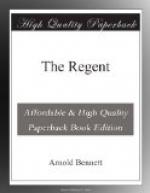Yes, they were revellers now! For the advent of her young men had transformed Rose Euclid, and Rose Euclid had transformed the general situation. At the table, Edward Henry occupied one side of it, Mr. Seven Sachs occupied the side opposite, Mr. Marrier, the very, very talented young manager, occupied the side to Edward Henry’s left, and Rose Euclid and Carlo Trent together occupied the side to his right.
Trent and Marrier were each about thirty years of age. Trent, with a deep voice, had extremely lustrous eyes, which eyes continually dwelt on Rose Euclid in admiration. Apparently, all she needed in this valley was oysters and admiration, and she now had both in unlimited quantities.
“Oysters are darlings,” she said, as she swallowed the first.
Carlo Trent kissed her hand, respectfully—for she was old enough to be his mother.
“And you are the greatest tragic actress in the world, Ra-ose!” said he in the Kensingtonian bass.
A few moments earlier Rose Euclid had whispered to Edward Henry that Carlo Trent was the greatest dramatic poet in the world. She flowered now beneath the sun of those dark lustrous eyes and the soft rain of that admiration from the greatest dramatic poet in the world. It really did seem to Edward Henry that she grew younger. Assuredly she grew more girlish and her voice improved. And then the bottles began to pop, and it was as though the action of uncorking wine automatically uncorked hearts also. Mr. Seven Sachs, sitting square and upright, smiled gaily at Edward Henry across the gleaming table and raised a glass. Little Marrier, who at nearly all times had a most enthusiastic smile, did the same. In the result five glasses met over the central bed of chrysanthemums. Edward Henry was happy. Surrounded by enigmas—for he had no conception whatever why Rose Euclid had brought any of the three men to his table—he was nevertheless uplifted.




